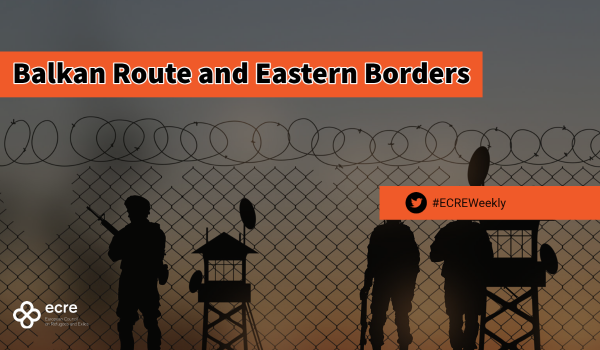People continue to report sexual harassment, physical violence and theft of personal belongings during pushbacks from Croatia to Bosnia and Herzegovina where they are detained in “classic prison”. Pope Francis gave a speech to an assembly of disadvantaged groups including refugees during his visit to Hungary that has “very few non-Ukrainian refugees”. Latvia starts criminal proceedings against migrants’ rights defenders despite concerns by Mary Lawlor, UN Special Rapporteur on Human Rights Defenders.
Croatian authorities systematically push back people on the move, including unaccompanied children and families with young children to Bosnia and Herzegovina (BiH) without assessing their asylum requests or protection needs, finds a new report by Human Rights Watch. “Border police frequently steal or destroy phones, money, identity documents, and other personal property, and often subject children and adults to humiliating and degrading treatment, sometimes in ways that are explicitly racist, the report reads. People affected by the expulsions testified that “they were intercepted across the whole territory of Croatia and escorted to police stations in unmarked vehicles. People, including women and children, were then detained in “prison-like basements, denied food and water and forced to sleep on the floor”. Moreover, they were also forced to sign documents related to the decision of deportation without being provided translation and asked to pay bills covering the cost of accommodation, food and transportation for those days after which they were transferred to detention facilities. “The police came. They had us remove our clothes. They took our phones. They searched us. We said we want to seek asylum in Croatia. We said we needed medical attention. They said, ‘Go.’ They deported us with no consideration of our situation. This was the fifth time this has happened to us”, said Stephanie M., a 35-year-old woman from Cameroon. Despite the overwhelming evidence of Croatia’s “abhorrent abuses”, the EU continues to contribute substantial funding to Croatian border. On 18 April, a group of Afghan refugees, who were victims of a brutal pushback from Croatia to BiH that included severe violence and sexual abuse in October 2020, filed a new lawsuit with the Constitutional Court of the Republic of Croatia, saying that authorities have failed to investigate the incident.
Minister for Human Rights and Refugees in BiH, Sevlid Hurtić described the EU-funded detention center inside of Lipa refugee camp as a “classic prison”, adding that “From the point of view of human rights, it is disgusting that such a thing exists in a human environment”. Border Violence Monitoring Network (BVMN), in its latest report, marked an increase in limb injuries resulting from falls from a bridge located over a river at the border between BiH and Serbia. Besides, people on the move transiting through Serbia experience pushbacks and degrading treatment – refugee advocates say that these systematic practices are legitimised “within the framework of cross-border cooperation” aimed at “combatting illegal migration”. Furthermore, activists working with refugees say that Serbian authorities use reception centres as a “migration control tool”. “They stay for three days, their data is taken and if they return later the police know that they have tried to cross, but they have failed, if they do not return it is because they have succeeded”, said activist Andjelka Grozdanic. On 24 April, a video of Serbian police beating people on the move while crossing to Bih circulated on social media. “Will there be consequences this time? Unfortunately, rather doubtful…”, said activist Kid Pex.
Pope Francis delivered a speech on 29 April to an assembly of disadvantaged groups including refugees in Hungary that has “very few non-Ukrainian refugees”. On 30 April, the Pope urged Hungarians not to close the door on migrants and those who are “foreign or unlike us” in a big outdoor mass attended by the country’s populist Prime Minister, Victor Orban, who has promised not to allow Hungary to be transformed into an “immigrant country”. Only 44 asylum seekers were granted protection in 2022 and while the authorities allowed the entrance of over 2.8 million persons fleeing Ukraine, registered only 33,273 applicants for temporary protection. While civil society organisations say that Hungarian authorities are failing Ukrainians as they struggle to deal with “significant obstacles” including accommodation and registration to school, the support system for non-Ukranian asylum seekers is “demolished” by the embassy system that was introduced in 2022.
Meanwhile, Mary Lawlor, UN Special Rapporteur on Human Rights Defenders, wrote to the government of Latvia concerning the alleged criminalisation of migrants’ rights defenders, Ieva Raubiško and Egils Grasmanis. Lawlor “urged that all necessary interim measures be taken to halt the alleged violations and prevent their re-occurrence”. The authorities, in their response, claimed that the criminal proceedings against the activists are taken to ensure the protection of the state borders, noting that their border guard practices comply with human rights requirements. They added that the criminal proceedings against the migrants’ rights defenders were “initiated by the border guards on the account of some of the activities carried out by these persons in the border zone” while refusing to share the “criminal case materials”.
For further information:
- ECRE, Balkan Route: EU Interior Ministers Agreed on Deportation Scheme from the Balkans in Secret, Enhanced EU-Serbia Cooperation Amid Increased Violence Towards Migrants, EU Commission Making 600 Million Euro Available to Support Member States with Border Control & Equipment, 24 March
- ECRE, Eastern Borders: Lithuania Legalised Pushbacks Despite Critique, Polish Authorities Blamed for Ongoing Deaths Along its Borders, Pope Francis Urged to Call Out Hungary’s Abusive Practices Towards Refugees During His Visit, 28 April

